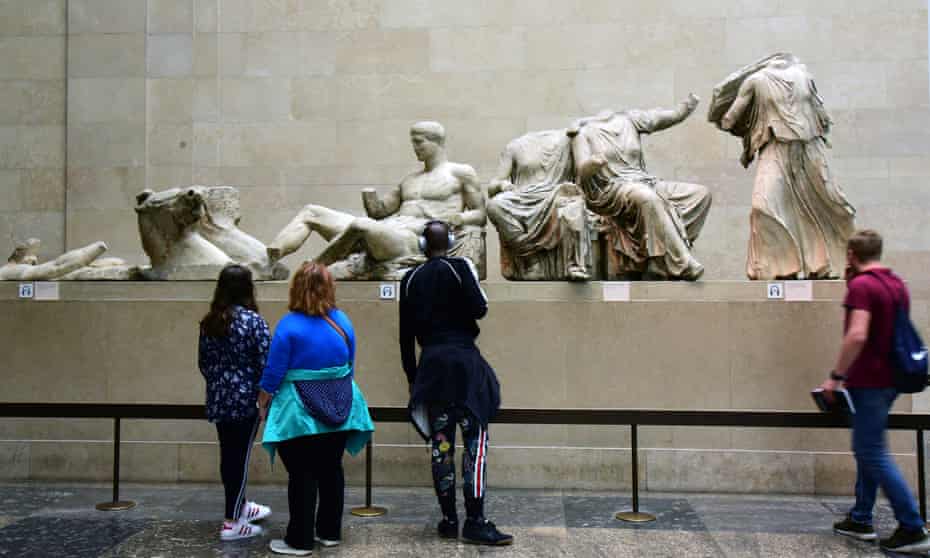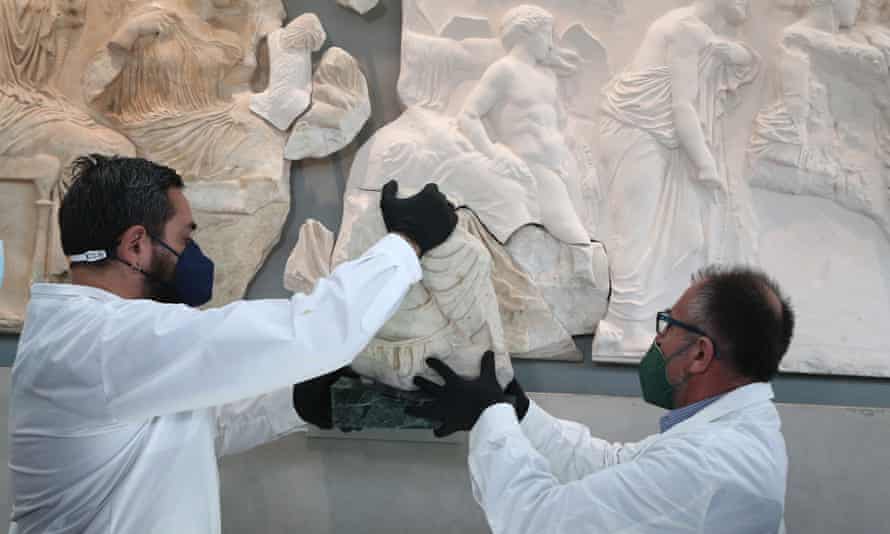Mon, 10 January 2022

The fragment is thought to depict the goddess Artemis (AFP/Giorgos KONTARINIS)
Greece on Monday welcomed Italy's return of a marble fragment from the Parthenon, calling on the British Museum to open talks on returning those parts of the archaeological monument it still holds.
The Greek culture ministry said the 2,500-year-old fragment had been returned from a museum in Sicily as "a deposit, not a loan" and would remain in the Greek capital for the next eight years.
Prime Minister Mitsotakis said that two "very important exhibits" would be sent to the Antonino Salinas Museum in Palermo in recognition of the gesture.
And he welcomed its arrival as a "very important step" towards Greece's ultimate goal -- the return of a large collection of Parthenon sculptures held by the British Museum.
"I think it paves the way also for the British Museum to enter into serious discussions with the Greek authorities, to find a solution that will be mutually acceptable," Mitsotakis said at the Acropolis Museum, which has housed the Parthenon sculptures since 2009.
"When there is a will, there is a way... sooner or later it will happen," he added, citing favourable opinion polls in the UK.
The fragment -- a foot and lower tunic from a sculpture thought to depict the huntress goddess Artemis -- was returned following an agreement between the museum and the Greek culture ministry.
It was in the collection of Robert Fagan, a 19th-century British consul to Sicily and Malta before the museum acquired it in 1836, the Greek PM's office said.
- The 'Elgin Marbles' dispute -
The Parthenon temple was built in the 5th century BCE on the Acropolis to honour Athena, the patron goddess of Athens.
After a Venetian bombardment partially destroyed it in 1687, workmen stripped entire friezes from the monument on the orders of Scottish nobleman Thomas Bruce, known as Lord Elgin, in the early 1800s.
Elgin sold the marbles to the British government, which in 1817 passed them on to the British Museum where they remain one of its most prized exhibits.
London has long argued that the sculptures had been taken with permission from the Ottoman Turks who ruled Greece at the time, but Athens insists they were stolen.
In an interview in March, British Prime Minister Boris Johnson ruled out the return of the marbles to Greece. They had been legally acquired by Britain and legally owned by the British Museum's Trustees since their acquisition, he said.
After a meeting with Mitsotakis in November, Johnson reiterated that the issue must be resolved by the trustees of the British Museum, not the British government.
Athens, which has received backing from a groundswell of celebrities on the issue, has repeatedly said it does not wish to pursue legal action to settle the bitter dispute.
It has called for the United Nations cultural agency UNESCO to act as mediator, an offer rejected by the British Museum.
Smaller Parthenon frieze collections and fragments are also in the Louvre and museums in Copenhagen, Munich, the Vatican, Vienna and Wurzburg.
burs-mr/jph/jj
Time has come for UK to return Parthenon marbles, says Greek PM
Kyriakos Mitsotakis says deal with Sicily ‘opens way’ for return of marbles from British Museum


Kyriakos Mitsotakis says deal with Sicily ‘opens way’ for return of marbles from British Museum

Parthenon sculptures displayed at the British Museum. Lord Elgin had the sculptures hacked from their monument more than 200 years ago.
Photograph: Waltraud Grubitzsch/dpa-Zentralbild/ZB
Helena Smith in Athens
Mon 10 Jan 2022
The long-awaited homecoming of a marble fragment, honed to adorn the Parthenon but long in exile in Italy, must “open the way” for other masterpieces to be reunited with the monument, the Greek prime minister has said.
As the artwork was unveiled at the Acropolis Museum, Kyriakos Mitsotakis said its restitution – sealed in a breakthrough deal between Sicily and Athens – offered a blueprint for similar accords to be reached, for example with the UK.
“This important step today opens the way, I believe, for other museums to be able to move in a similar direction,” he told attenders at Monday’s ceremony. “Most importantly, of course, the British Museum should understand that the time has come for the Parthenon marbles … to finally return here, to their natural home.”
The exquisite piece is barely the size of a shoebox. Carved 2,500 years ago, it depicts the foot of a draped Artemis, goddess of the hunt, peeking out from beneath an elaborate tunic. The fragment once embellished the eastern part of the Parthenon temple’s monumental frieze, long regarded as the high point of classical art.
The treasure was returned last week to Greece by the Antonio Salinas Regional Archaeological Museum in Sicily, ostensibly as part of a cultural exchange.
Helena Smith in Athens
Mon 10 Jan 2022
The long-awaited homecoming of a marble fragment, honed to adorn the Parthenon but long in exile in Italy, must “open the way” for other masterpieces to be reunited with the monument, the Greek prime minister has said.
As the artwork was unveiled at the Acropolis Museum, Kyriakos Mitsotakis said its restitution – sealed in a breakthrough deal between Sicily and Athens – offered a blueprint for similar accords to be reached, for example with the UK.
“This important step today opens the way, I believe, for other museums to be able to move in a similar direction,” he told attenders at Monday’s ceremony. “Most importantly, of course, the British Museum should understand that the time has come for the Parthenon marbles … to finally return here, to their natural home.”
The exquisite piece is barely the size of a shoebox. Carved 2,500 years ago, it depicts the foot of a draped Artemis, goddess of the hunt, peeking out from beneath an elaborate tunic. The fragment once embellished the eastern part of the Parthenon temple’s monumental frieze, long regarded as the high point of classical art.
The treasure was returned last week to Greece by the Antonio Salinas Regional Archaeological Museum in Sicily, ostensibly as part of a cultural exchange.

Conservators at the Acropolis Museum in Athens place the Parthenon fragment sent from Sicily.
Photograph: Panayotis Tzamaros/NurPhoto/REX/Shutterstock
Under the deal it was agreed that the loan, due to expire in 2026, could be extended for a further four years. In return, Athens has lent the Palermo Museum a headless fifth-century BC statue of the goddess Athena and an eighth-century BC amphora.
But culture ministry officials acknowledged negotiations were under way to ensure that the artefact’s repatriation was “indefinite”, in what would amount to added pressure on the British Museum to follow suit.
More than half of what survives of the 160-metre long frieze is on display in London. Lord Elgin, Britain’s then ambassador to the Sublime Porte, had the sculptures hacked from the monument more than 200 years ago before he sold them, bankrupt and despondent, to the British Museum in 1816.
Eight museums across Europe house other parts of the frieze; the Acropolis Museum in Athens, custom-built to exhibit the treasures, exhibits about 50 metres worth.
Mitsotakis, who has reinvigorated Greece’s decades-long campaign for the antiquities’ reunification in Athens, made the marbles’ restitution the central issue of his first Downing Street talks with the prime minister, Boris Johnson, in November.
Athens has long argued that the marbles were stolen by Elgin at a time when stateless Greece was under Ottoman rule.
Although once a passionate champion of the sculptures’ return to the country, Johnson has changed course, insisting that the carvings were legally acquired. He rejected Mitsotakis’ assertion that the row should be resolved as an intergovernmental matter, saying it was an issue for the British Museum to discuss.
But the Greek leader said on Monday that Athens remained undeterred in its battle to retrieve the treasures, and that the deal with the Palermo museum had proved that where there was a will, a “mutually acceptable solution” could be found. Athens has offered to give London antiquities that have never before left Greece in return for the masterpieces.
“I am especially encouraged by the fact that the majority of Britons appear to support our demand,” Mitsotakis said, referring to successive polls that have shown most UK citizens believe the marbles should be returned to Athens.
Under the deal it was agreed that the loan, due to expire in 2026, could be extended for a further four years. In return, Athens has lent the Palermo Museum a headless fifth-century BC statue of the goddess Athena and an eighth-century BC amphora.
But culture ministry officials acknowledged negotiations were under way to ensure that the artefact’s repatriation was “indefinite”, in what would amount to added pressure on the British Museum to follow suit.
More than half of what survives of the 160-metre long frieze is on display in London. Lord Elgin, Britain’s then ambassador to the Sublime Porte, had the sculptures hacked from the monument more than 200 years ago before he sold them, bankrupt and despondent, to the British Museum in 1816.
Eight museums across Europe house other parts of the frieze; the Acropolis Museum in Athens, custom-built to exhibit the treasures, exhibits about 50 metres worth.
Mitsotakis, who has reinvigorated Greece’s decades-long campaign for the antiquities’ reunification in Athens, made the marbles’ restitution the central issue of his first Downing Street talks with the prime minister, Boris Johnson, in November.
Athens has long argued that the marbles were stolen by Elgin at a time when stateless Greece was under Ottoman rule.
Although once a passionate champion of the sculptures’ return to the country, Johnson has changed course, insisting that the carvings were legally acquired. He rejected Mitsotakis’ assertion that the row should be resolved as an intergovernmental matter, saying it was an issue for the British Museum to discuss.
But the Greek leader said on Monday that Athens remained undeterred in its battle to retrieve the treasures, and that the deal with the Palermo museum had proved that where there was a will, a “mutually acceptable solution” could be found. Athens has offered to give London antiquities that have never before left Greece in return for the masterpieces.
“I am especially encouraged by the fact that the majority of Britons appear to support our demand,” Mitsotakis said, referring to successive polls that have shown most UK citizens believe the marbles should be returned to Athens.
No comments:
Post a Comment